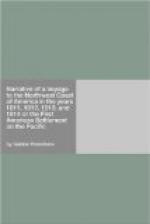Mr. Hunt had then passed nearly six months at the Sandwich islands, expecting the annual ship from New York, and never imagining that war had been declared. But at last, weary of waiting so long to no purpose, he had bought a small schooner of one of the chiefs of the isle of Wahoo, and was engaged in getting her ready to sail for the mouth of the Columbia, when four sails hove in sight, and presently came to anchor in Ohetity bay. He immediately, went on board of one of them, and learned that they came from the Indies, whence they had sailed precipitately, to avoid the English cruisers. He also learned from the captain of the vessel he boarded, that the Beaver had arrived in Canton some days before the news of the declaration of war. This Captain Smith, moreover, had on board some cases of nankeens and other goods shipped by Mr. Astor’s agent at Canton for us. Mr. Hunt then chartered the Albatross to take him with his people and the goods to the Columbia. That gentleman had not been idle during the time that he sojourned at Wahoo: he brought us 35 barrels of salt pork or beef, nine tierces of rice, a great quantity of dried Taro, and a good supply of salt.
As I knew the channel of the river, I went on board the Albatross, and piloted her to the old anchorage of the Tonquin, under the guns of the Fort, in order to facilitate the landing of the goods.
Captain Smith informed us that in 1810, a year before the founding of our establishment, he had entered the river in the same vessel, and ascended it in boats as far as Oak Point; and that he had attempted to form an establishment there; but the spot which he chose for building, and on which he had even commenced fencing for a garden, being overflowed in the summer freshet, he had been forced to abandon his project and re-embark. We had seen, in fact, at Oak Point, some traces of this projected establishment. The bold manner in which this captain had entered the river was now accounted for.
Captain Smith had chartered his vessel to a Frenchman named Demestre, who was then a passenger on board of her, to go and take a cargo of sandal wood at the Marquesas, where that gentleman had left some men to collect it, the year before. He could not, therefore, comply with the request we made him, to remain during the summer with us, in order to transport our goods and people, as soon as they could be got together, to the Sandwich islands.
Mr. Hunt was surprised beyond measure, when we informed him of the resolution we had taken of abandoning the country: he blamed us severely for having acted with so much precipitation, pointing out that the success of the late coasting voyage, and the arrangements we had made with the Russians, promised a most advantageous trade, which it was a thousand pities to sacrifice, and lose the fruits of the hardships he had endured and the dangers he had braved, at one fell swoop, by this rash measure. Nevertheless, seeing the partners




